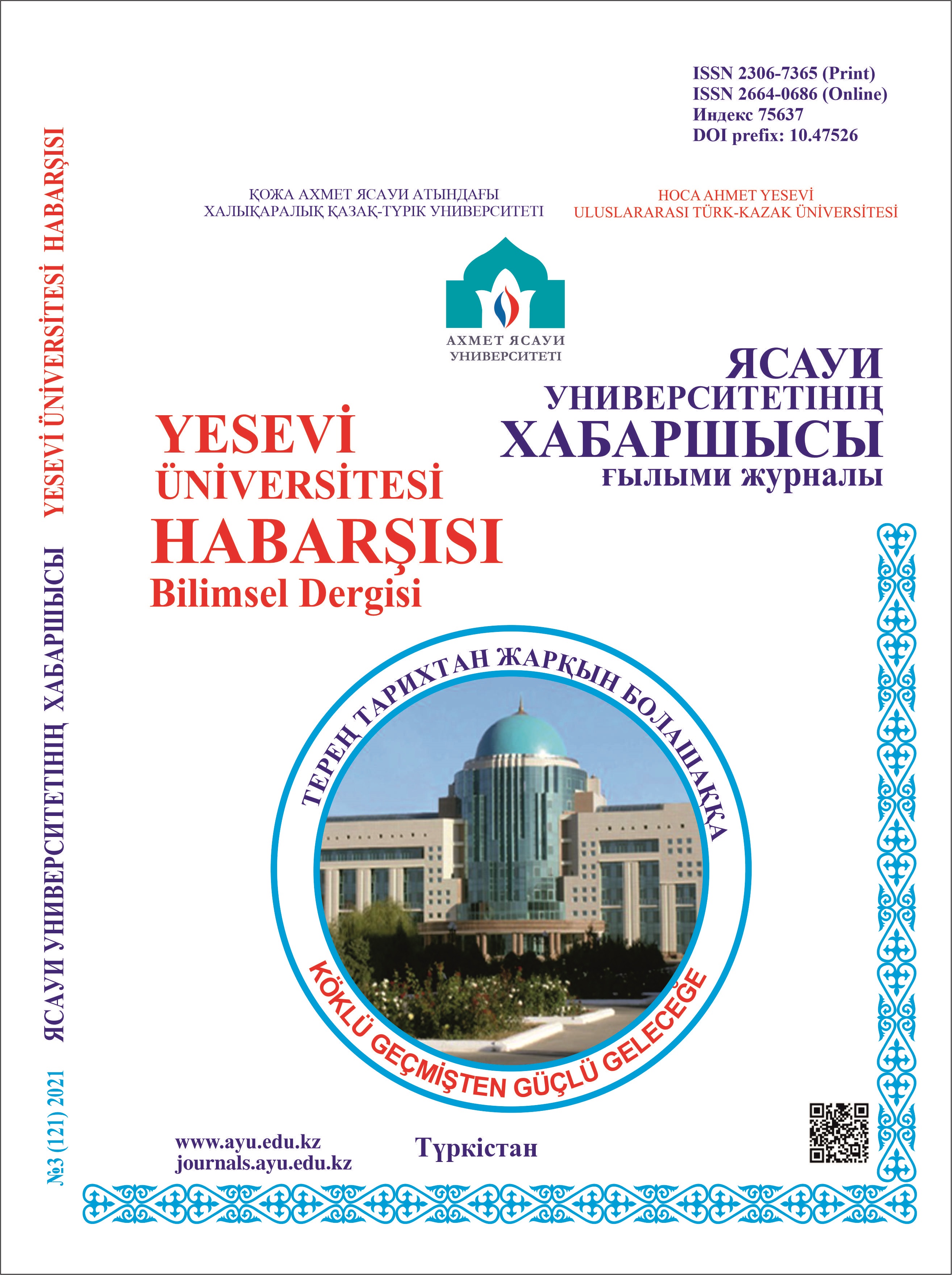Трансформация: зерттеу қызметінің себеп-салдарлық байланыстарын түсіну және оларды қойылған мақсаттар мен міндеттерге сәйкес қолдана білу
200 97
Кілт сөздер:
трансформация, ойлау, себеп-салдарлық байланыстар, зерттеу, оқу-танымдық процесс, әдіс, салыстырмалы талдау.Аңдатпа
Әлемдік білім беру кеңістігінде болып жатқан жаһандық трансформациялық процестер жағдайында қоғамдық даму мен білім берудің өзара тәуелділігі барған сайын айқын бола түсуде. Бұл зерттеудің мақсаты оқу-зерттеу қызметі субъектісіндегі терең өзгерістерді және олардың педагогикалық мәдениетке әсерін талдау болып табылады. Берілген зерттеу жұмысы субъектінің өзгеруіне ықпал ететін факторларды, соның ішінде қоғамның сұраныстарын, білім беру жүйесінің даму деңгейін, педагогикалық теория мен технологияны және жеке ерекшеліктерді қарастырады. Тәлімгерлік практикаға субъектілердің генеративтілігін тиімді қалыптастыру шарты ретінде ерекше назар аударылады, бұл олардың мотивациясына және кәсіби дағдыларын шыңдауға ықпал етеді. Зерттеу білім берудің өзекті талаптары мен болашақ динамикасын түсіну арасындағы жылдам өзгерістер мен қайшылықтардан туындаған стресстік жағдайларды анықтай отырып, білім беру практикасын жаңғырту мен реформалаудың шетелдік тәжірибесін талдауға негізделген. Зерттеу гипотезасы білім берудің қолданыстағы теориялары мен «тұлғаның өзгеруі» ғылыми тұжырымдамасы арасындағы қайшылықтан туындайды. Білім беруді модернизациялау және қажеттіліктерді қанағаттандырудың орнына адамның дамуына баса назар аудару өзін-өзі көрсетуге және жеке тұлғаның әлеуетін ашуға жаңа көзқарасты қалыптастыруға ықпал етті.
Зерттеу әдісі ретінде педагогикалық эксперимент қолданылды, аталмыш педагогикалық эксперименттің мақсаты кәсіби және зерттеу қызметіндегі себеп-салдарлық байланыстарды түсіну процесіне нақты факторлар мен жағдайлардың әсерін анықтау, салыстырмалы түрде талдау және оларды белгіленген мақсаттар мен міндеттерге сәйкес қолдану болып табылады. Экспериментке 52 магистрант пен докторант қатысты. Зерттеу әдісі ретінде фронтальды жазбаша сауалнаманы қолданылды, оның мақсаты респонденттердің педагогикалық және ғылыми-зерттеу жұмыстарына дайындығы, сондай-ақ қиындықтарды жеңу және олардың кәсіби қызметінде себеп-салдарлық байланыстарды қолдану қабілеті туралы мәліметтерді жинақтау болды. Эксперимент адамның өзінің қабілеттері мен мүмкіндіктерін түсіну процесінің параметрлері мен нәтижелерін өлшеуге мүмкіндік берді. Қорытындылай келе, зерттеу білім беру стандарттарын заманауи шындыққа бейімдеу және трансформация процесінде себеп-салдарлық байланыстарды тереңірек түсіну қажеттілігін көрсетеді.
Әдебиеттер тізімі
Davydov V. Problema obrazovania v svete koncepcii predmetnoi deiatelnosti [Problems of education in the field of the concept of subject activity]. – M.: Akademia, 1996. –128 s. [in Russian]
Gibbons M. et al. The New Production of Knowledge: The Dynamics of Science and Research in Contemporary Societies. – Sage Publications, 2002. – 173 p.
Hoosain Khan G., Barnes N., Alves S. Tracing Transformation in Turbulent Times: Two Case Studies for Monitoring and Evaluating Transformation in Higher Education // International Journal of Critical Diversity Studies. − 2022. − №4(2). – P. 12–30. https://doi.org/10.13169/intecritdivestud.4.2.0012
Sutantro S. Why Innovation Absolutely Matters in Education [Electronic resource]. URL: https://online.nwmissouri.edu/programs/education/msed/leadership/innovation-matters-in-education/ (date of access 15.02.2023)
Novikov A., Novikov D. Obrazovatelnyi proekt. Metodologia prakticheskoi obrazovatelnoi deiatelnosti [An educational project. Methodology of practical educational activities]–M.: Egves, 2004. – 120 s. [in Russian]
Berejnova E., Kraevskiy V. Osnovy uchebno-issledovatelskoi deiatelnosti studentov [Fundamentals of educational and research activities of students]. 5-oe izd. – M.: Izd. centr «Akademia», 2008. – 128s. [in Russian]
Wang X., Li Z. Evaluating the impact of methodological transformations on research outcomes // Journal of Applied Research. − 2022. − №29(4). – P. 789–785.
Fullan M., Hargreaves A. Professional capital: Transforming teaching in every school. – New York: Teachers College Press, 2012. – 220 p.
Hargreaves A., Shirley D. The global fourth way: The quest for educational excellence. [Electronic resource]. URL: https://us.sagepub.com/en-us/nam/book/global-fourth-way (date of access 15.02.2023)
Darling-Hammond, L. Empowered educators: How high-performing systems shape teaching quality around the world. [Electronic resource]. URL: https://www.researchgate.net/publication/319534035_Empowered_Educators_How_high_performing_systems_shape_teaching_around_the_world (date of access 15.02.2023)
Sahlberg P. Finnish lessons 2.0: What can the world learn from educational change in Finland. – New York: Teachers College Press, 2011. – 86 p.
Clark B. The Higher Education System: Academic Organization in Cross-National Perspective. − University of California Press, 1983. – 112 p.
Berejnova E., Kraevsky V. Pedagogika: Teoria i Praktika [Pedagogy: Theory and Practice]. –M.: Akademia, 2003. –149 s. [in Russian]
Bordovskaia N. Dialektika pedagogicheskogo issledovania: monografia [Dialectics of pedagogical research. Logical and methodological problems: monograph]. − M.: KnoRus, 2016. − 512 s. [in Russian]

